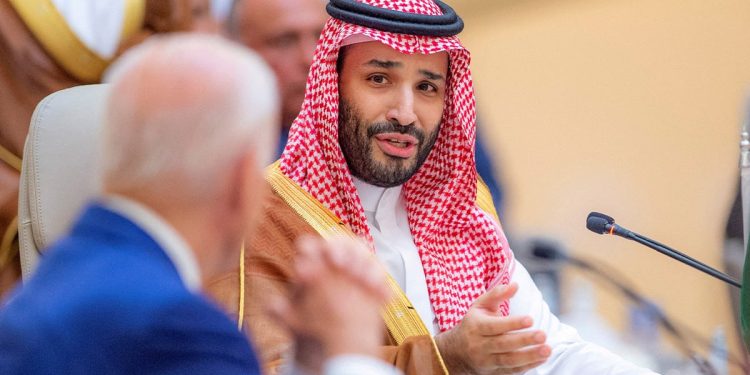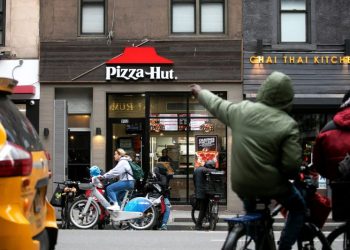
To say that the Middle East is a volatile region is an understatement, and yet its centrality to global stability is still often forgotten. In fact, the region could be far more disruptive to the world were it not anchored at its core in the Arabian Peninsula by an influential state, Saudi Arabia, and its partners in the Gulf Cooperation Council (GCC)—status quo powers that have a vested interest in a well-functioning global economic and political order.
Strengthening this anchor with a formal US-Saudi security alliance would serve to keep the GCC solidly in the U.S. orbit in an increasingly multipolar world. These are, after all, states with the resources and the will to actively support the United States in upholding a U.S.-led regional order.
Even a small crack in this order, as evidenced by the Houthis’ hostile actions toward global shipping in the past six months, shows just how much global disruption a revolutionary actor from this region can cause. So far, the Houthis have disrupted shipping lanes in the Red Sea and the Arabian Sea, caused a massive increase in insurance and freight prices, and saddled the United States and its allies with the conundrum of how to deal with this problem without landing troops to occupy Houthi-controlled Yemen. The Houthi challenge is but a foretaste of what would happen should a responsible status quo power like Saudi Arabia or its Gulf allies be destabilized by a revolutionary power such as Iran or a militia like the Houthis.
That the stability of the Arabian Peninsula is taken completely for granted by many observers in the West represents a failure of the imagination, as Saudi Arabia, with its wealth and holy places, is a country that jihadi Islamists such as Al Qaeda, and revolutionary Iran and its proxies, have sought to capture for decades. Indeed, the Kingdom of Saudi Arabia is the ultimate prize for those who want to topple the U.S.-led order in the region. Failure to recognize this or to imagine what would happen should radical revisionist elements succeed in disrupting Saudi stability is short-sighted and strategically dangerous.
Control of the Arabian Peninsula means control of nearly 50 percent of the world’s oil and gas reserves and hence control over global oil and gas prices, which would explode upwards in a crisis, never mind the impact of malign forces disrupting the heartland of Islam with the influence this would give them over hundreds of millions of Muslims across the world.
Just one example of such malign thinking can be seen in a comment by the late Abu Mahdi al-Muhandis, the Iran-backed Iraqi militia leader who was killed with IRGC leader Suleimani in a U.S. strike. Asked on Iranian TV if he looked forward to martyrdom in liberating Jerusalem, he responded, ‘Not Jerusalem, Riyadh!’
This is why helping Saudi Arabia secure and uphold a U.S.-led order in the region via a formal security alliance between the two nations is important to U.S. economic and national security interests. Moreover, a guaranteed commitment of this nature would constitute a strong deterrent to an Iran that has been energized in recent years by the weak US responses to its many provocations such as the bombing of Saudi oil fields in 2019, its subsequent interference with tanker traffic out of the Persian Gulf, and its support of the Houthis in Yemen.
American critics often highlight a lack of ‘shared values’ between the U.S. and the Kingdom when they argue against a security alliance between these two countries. What they mean is that Saudi Arabia is an absolute monarchy and, thus, not a worthy ally because it is not democratic. Focusing on this difference alone ignores the many values and interests actually shared between the two countries. Among these is a mutual desire for an open capitalist world economy, predictable energy markets, safe trade routes, the containment of rogue states that violate international law, and a stable Middle East.
At the same time, Saudi Arabia is a country undergoing dramatic social, economic, and religious reform, probably more sweeping than any other country in modern times. This process has had its ups and downs and yet has achieved, remarkably, the empowerment of women previously shackled by conservatism, the doubling of their participation in the workforce, and the marginalization of radical Islamic elements in all spheres of life. Saudi Arabia has gone from being a country that promoted extreme Islamic conservatism across the globe to one that today actively promotes tolerance among the world’s Muslim communities.
The Kingdom still has some hard work to do in reforming its legal system and improving its human rights record. This is acknowledged by the leadership as they work to hold the country together through dramatic change in a highly polarized environment where radical religious dissent could tear society apart.
The United States needs strong allies in this emerging multipolar world. A midsize power like Saudi Arabia adds considerable value to a US-led world order. As an alliance partner of the United States, Saudi Arabia would hold an important piece of the global political and economic infrastructure needed to uphold this order across the region and globally.

To say that the Middle East is a volatile region is an understatement, and yet its centrality to global stability is still often forgotten. In fact, the region could be far more disruptive to the world were it not anchored at its core in the Arabian Peninsula by an influential state, Saudi Arabia, and its partners in the Gulf Cooperation Council (GCC)—status quo powers that have a vested interest in a well-functioning global economic and political order.
Strengthening this anchor with a formal US-Saudi security alliance would serve to keep the GCC solidly in the U.S. orbit in an increasingly multipolar world. These are, after all, states with the resources and the will to actively support the United States in upholding a U.S.-led regional order.
Even a small crack in this order, as evidenced by the Houthis’ hostile actions toward global shipping in the past six months, shows just how much global disruption a revolutionary actor from this region can cause. So far, the Houthis have disrupted shipping lanes in the Red Sea and the Arabian Sea, caused a massive increase in insurance and freight prices, and saddled the United States and its allies with the conundrum of how to deal with this problem without landing troops to occupy Houthi-controlled Yemen. The Houthi challenge is but a foretaste of what would happen should a responsible status quo power like Saudi Arabia or its Gulf allies be destabilized by a revolutionary power such as Iran or a militia like the Houthis.
That the stability of the Arabian Peninsula is taken completely for granted by many observers in the West represents a failure of the imagination, as Saudi Arabia, with its wealth and holy places, is a country that jihadi Islamists such as Al Qaeda, and revolutionary Iran and its proxies, have sought to capture for decades. Indeed, the Kingdom of Saudi Arabia is the ultimate prize for those who want to topple the U.S.-led order in the region. Failure to recognize this or to imagine what would happen should radical revisionist elements succeed in disrupting Saudi stability is short-sighted and strategically dangerous.
Control of the Arabian Peninsula means control of nearly 50 percent of the world’s oil and gas reserves and hence control over global oil and gas prices, which would explode upwards in a crisis, never mind the impact of malign forces disrupting the heartland of Islam with the influence this would give them over hundreds of millions of Muslims across the world.
Just one example of such malign thinking can be seen in a comment by the late Abu Mahdi al-Muhandis, the Iran-backed Iraqi militia leader who was killed with IRGC leader Suleimani in a U.S. strike. Asked on Iranian TV if he looked forward to martyrdom in liberating Jerusalem, he responded, ‘Not Jerusalem, Riyadh!’
This is why helping Saudi Arabia secure and uphold a U.S.-led order in the region via a formal security alliance between the two nations is important to U.S. economic and national security interests. Moreover, a guaranteed commitment of this nature would constitute a strong deterrent to an Iran that has been energized in recent years by the weak US responses to its many provocations such as the bombing of Saudi oil fields in 2019, its subsequent interference with tanker traffic out of the Persian Gulf, and its support of the Houthis in Yemen.
American critics often highlight a lack of ‘shared values’ between the U.S. and the Kingdom when they argue against a security alliance between these two countries. What they mean is that Saudi Arabia is an absolute monarchy and, thus, not a worthy ally because it is not democratic. Focusing on this difference alone ignores the many values and interests actually shared between the two countries. Among these is a mutual desire for an open capitalist world economy, predictable energy markets, safe trade routes, the containment of rogue states that violate international law, and a stable Middle East.
At the same time, Saudi Arabia is a country undergoing dramatic social, economic, and religious reform, probably more sweeping than any other country in modern times. This process has had its ups and downs and yet has achieved, remarkably, the empowerment of women previously shackled by conservatism, the doubling of their participation in the workforce, and the marginalization of radical Islamic elements in all spheres of life. Saudi Arabia has gone from being a country that promoted extreme Islamic conservatism across the globe to one that today actively promotes tolerance among the world’s Muslim communities.
The Kingdom still has some hard work to do in reforming its legal system and improving its human rights record. This is acknowledged by the leadership as they work to hold the country together through dramatic change in a highly polarized environment where radical religious dissent could tear society apart.
The United States needs strong allies in this emerging multipolar world. A midsize power like Saudi Arabia adds considerable value to a US-led world order. As an alliance partner of the United States, Saudi Arabia would hold an important piece of the global political and economic infrastructure needed to uphold this order across the region and globally.

















